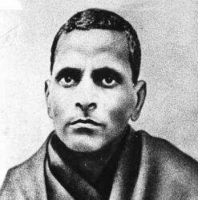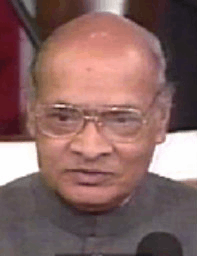Telugu people
| |||||||||||||||||||||||||||||||||
| Total population | |||||||||||||||||||||||||||||||||
|---|---|---|---|---|---|---|---|---|---|---|---|---|---|---|---|---|---|---|---|---|---|---|---|---|---|---|---|---|---|---|---|---|---|
| 75 million | |||||||||||||||||||||||||||||||||
| Regions with significant populations | |||||||||||||||||||||||||||||||||
| 75 million[1] | |||||||||||||||||||||||||||||||||
| 90,000 | |||||||||||||||||||||||||||||||||
| 50,000 | |||||||||||||||||||||||||||||||||
| 40,000 | |||||||||||||||||||||||||||||||||
| 30,000 | |||||||||||||||||||||||||||||||||
| 20,000 | |||||||||||||||||||||||||||||||||
| 24,000 | |||||||||||||||||||||||||||||||||
| 300,000 | |||||||||||||||||||||||||||||||||
| Languages | |||||||||||||||||||||||||||||||||
| Telugu | |||||||||||||||||||||||||||||||||
| Religion | |||||||||||||||||||||||||||||||||
| Hinduism · Islam · Christianity · Buddhism · Jainism | |||||||||||||||||||||||||||||||||
| Related ethnic groups | |||||||||||||||||||||||||||||||||
|
Brahui · Gondi · Kalinga · Kannadiga · Dravidian People | |||||||||||||||||||||||||||||||||
| Part of a series on the |
| Telangana Culture |
|---|
 |
|
History |
|
People |
|
Festivals and Traditions |
|
Languages |
|
Cuisine |
|
Arts and Crafts • Music of Telangana • Shadow Puppets of Telangana |
|
Literature |
|
Tourism |
|
Cinema |
|
|
| Part of a series on the |
| Culture of Andhra Pradesh |
|---|
 |
| History |
| People and culture |
|
| Part of a series on |
| Dravidian culture and history |
|---|
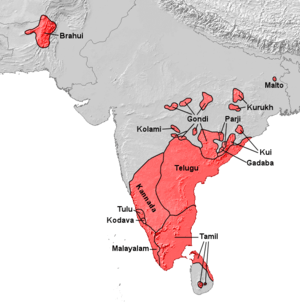 |
|
History
|
|
Culture
|
|
Language
|
|
Religion
|
|
Regions
|
|
People
|
| Portal:Dravidian civilizations |
The Telugu people or Telugu Prajalu are an ethnic group of India. The majority of them reside in the states of Andhra Pradesh and Telangana. They speak the Telugu language, the most spoken South Indian (Dravidian) language, and the third most spoken language in India [2] as well as the Indian sub-continent after Hindi and Bengali.
History
Antiquity
The Sanskrit epics mention the Andhra Kingdom at the time of the death of the great Mauryan King Ashoka in 232 BC. This date has been considered to be the beginning of the Andhra historical record. Various dynasties have ruled the area, including the Satavahanas, Sakas, Andhra Ikshvakus, Eastern Chalukyas, Pallavas, Pandyans, Cholas, Telugu Cholas, The Bobbili, the Vijayanagara Kingdom, the Qutb Shahis of Golconda, and the Nizams (princes) of Hyderābād.[3]
The term Kalinga has been historically relevant to this region, incorporating north-east Andhra Pradesh and modern day Odisha. Andhras and Kalingas supported the Kauravas during the Mahabharata war. Sahadeva defeated the kingdoms of Pandya, Dravida, Odra, Chera, Andhra, and Kalinga while performing the Rajasuya yajna. Chanoora was killed by Krishna in Mathura. Hari Vamsa Purana corroborates the fact that Chanoora was the king of Karoosa Desa (to the North of the Vindhyas and on the North Bank of the Yamuna river) and was an Andhra. Buddhist references to Andhras are also found.[4]
Satavahanas
The first great Andhra empire was that of the Satavahanas,[5] who came to power when the last Kanva emperor Sisuman, was assassinated by his prime minister Sipraca, of the Andhra tribe. They reigned for 450 years and the last was Puliman or Puloma the pious, who after conquering India put an end to his life by drowning himself in the holy waters of the Ganges river, after the example of his grandfather. Because of this king, India was called Poulomeun-koue, the country of Puliman by the Chinese. While in the west the inhabitants of the Gangetic provinces were denominated Andhra Hindus. The Satavahana rulers are said to have been held in the highest veneration all over India; and their fame was extended to the Malay Archipelago, the Maharajas of India being a favorite subject of Malayan poetry.[6]
Andhra, Karnataka and Maharastra states observe the same new year day. This calendar reckons dates based on the Shalivahana era (Shalivahana Saka), which begins its count from the supposed date of the founding of the Empire by the legendary hero Shalivahana. The Satavahana king Shalivahana (also identified as Gautamiputra Satakarni) is credited with the initiation of this era known as Shalivahana. The Salivahana era begins its count of years from the year corresponding to 78 AD of the Gregorian calendar. Thus, the year 2000 AD corresponds to the year 1922 of the Salivahana Era.
Language
Telugu is a South-Central Dravidian language primarily spoken in the states of Andhra Pradesh and Telangana, India, where it is an official language. Early inscriptions date from 620 AD and literary texts from the 11th century, written in a Telugu script adapted from the Bhattiprolu script of the early inscriptions.
Culture
Literature
Arts
Kuchipudi is a famous Classical Indian dance from Andhra Pradesh, India.
- Kuchipudi
- Vilasini Natyam
- Andhra Natyam
- Cinema of Andhra Pradesh

Clothing
- Male
- Uttareeyam or Pai Pancha (Angavastram or veil)
- Pancha (Dhoti)
- Jubba (Kurta) The top portion
- Lungi (Casual dress)
- Women
- Cheera (Sari)
- Girls
- Langa Oni (Half sari)
- Parikini
Festivals
Important festivals celebrated by Telugu people include:
- Makara Sankranti in January. (The exact date may vary as per the Hindu calendar.)
- Maha Shivaratri in February/March. (The exact date may vary as per the Hindu calendar.)
- Ugadi or the Telugu New Year in March/April. (The exact date may vary as per the Hindu calendar.)
- Sri Rama Navami celebrated in March/April, 9 days after Ugadi. (The exact date may vary as per the Hindu calendar.)
- Bonalu celebrated in Ashada masam (July/August). (The exact date may vary as per the Hindu calendar.)
- Varalakshmi Vratam in August. (The exact date may vary as per Hindu calendar.)
- Vinayaka Chaviti in August. (The exact date may vary as per the Hindu calendar.)
- Bathukamma celebrated for nine days during Durga Navratri.
- Dasara in September/October. (The exact date may vary as per the Hindu calendar.)
- Atla Tadde 3rd day in bright half of Ashviyuja month (falls in September/October in Gregorian calendar). However, the exact date may vary according to the Hindu calendar.
- Deepavali in October/November. (The exact date may vary as per the Hindu calendar.)
See also
- Kakatiya dynasty
- Satavahana dynasty
- Krishnadevaraya
- List of people from Andhra Pradesh
- Telugu development
- List of Telugu people
- Andhra cuisine
- Hyderabad, India
- Andhra diaspora
References
- ↑ Telugu | About World Languages, archived from the original on March 18, 2015
- ↑ http://timesofindia.indiatimes.com/india/Nearly-60-of-Indians-speak-a-language-other-than-Hindi/articleshow/36922157.cms
- ↑ http://encarta.msn.com/encyclopedia_761580539/Andhra_Pradesh.html
- ↑ Śrīhari, R. (1984-03-05). Proceedings of the Andhra Pradesh Oriental Conference: Fourth session, Nagarjuna University, Guntur, 3rd to 5th March 1984. The Conference. Retrieved 2011-08-19.
- ↑ Burrow, Thomas (1984-03-05). Collected Papers on Dravidian Linguistics. Annamalai University. Retrieved 2011-08-19.
- ↑ Conder, Josiah (1828). The Modern Traveller: A Popular Description, Geographical, Historical, and Topographical of the Various Countries of the Globe. James Duncan. p. 141.
External links
| Wikimedia Commons has media related to Telugu people. |
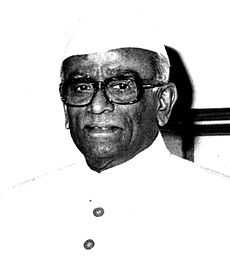
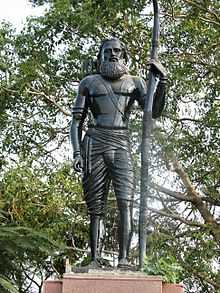







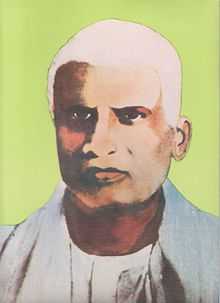
.jpg)


